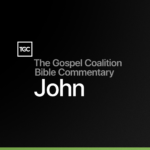Recently at my men’s Bible study, a college student explained how the “metanarrative of Scripture” made sense of the passage we were examining. Even just 20 years ago, when I was in college, I don’t recall anyone besides an occasional professor using this kind of language. Now it’s become almost normal for believers to examine the big story of the Bible and to think about the contributions of each book to the larger picture of God’s revelation.
What’s changed? How did we get to the point where next-generation leaders assume the interconnectedness of the Bible?
The assumption of the interconnectedness of the Bible—a vast book, written in multiple languages by dozens of authors, across thousands of years—shouldn’t be taken for granted. In many ways, the young leaders of today benefit from decades of work in the field of biblical theology—a discipline that played a major role in the growth of Reformed theology in the evangelical church and in the ministry of The Gospel Coalition in particular. Despite its pervasiveness, the study of biblical theology is an area where new contributions are desperately needed. And one of those new contributions comes in the form of a nearly 1000-page tome from Andreas Köstenberger and Gregory Goswell, Biblical Theology: A Canonical, Thematic, and Ethical Approach.
Köstenberger is no stranger to students of the Bible. He’s written dozens of works—Bible introductions, commentaries, hermeneutics guides, ministry resources, and so much more. Undoubtedly, Biblical Theology serves as something of a career capstone for Köstenberger, distilling much of what he’s addressed over the decades of his ministry and writing career. But along with Köstenberger, co-author Gregory Goswell from Christ College, Sydney, provides deeper levels of insight around the Old Testament. Together, these scholars of the Old and New Testaments help us listen to Scripture better.
I corresponded with Köstenberger about this new book, and he shared how this new approach gives every book of the Bible a seat at the table.
What is biblical theology and how does it differ from other disciplines such as systematic theology or movements like the theological interpretation of Scripture (TIS)?
Biblical theology pursues the theology of the biblical writers themselves through sustained listening to the various texts of Scripture. The way we see it, biblical theology is about connections, while systematic theology is about construction. In our biblical theology, we draw connections between the different voices in the canon, between earlier and later Old Testament (OT) books, between New Testament (NT) and OT books and texts, and so forth. In some cases, we see a NT author cite an OT text which cites an earlier OT text.
Biblical theology is about connections, while systematic theology is about construction.
For example, Jesus’s “I am” sayings in John (6:35; 8:12; 10:7, 11; 11:25; 14:6; 15:1) likely reflect Isaiah’s language about Yahweh in Isaiah 40–66, which harks back to God’s self-identification to Moses in Exodus as “I AM” (Ex. 3:14). Since biblical theology is a historical, inductive, and descriptive discipline, we seek to understand texts on their own terms and draw connections between the texts, or “intertextual connections,” delicately and with care while respecting biblical terminology, the original historical setting, and their place and time in the history of God’s dealings with his people.
Systematic theology ideally is based on biblical theology and engages in theological construction based on a taxonomy of important biblical topics such as God, Christ, salvation, the Spirit, and the church. It arranges the biblical material topically, logically, and in the contemporary context to show the relevance of Scripture in addressing today’s questions.
When it comes to TIS, the key question, as we see it, is how people define “theological.” If by that we mean we recognize God as the author of Scripture—that the Bible is revelation from God and written to reveal God, his character, and his ways—there’s much common ground between biblical theology and TIS.
We believe it’s important to recognize, however, that TIS didn’t invent the theological interpretation of Scripture. Far from it; the best commentators have always asked theological questions of the text. For TIS, starting with God is a broad, deductive presupposition when coming to Scripture, while in biblical theology, we seek to interpret texts inductively and to draw connections between related scriptural passages in keeping with the beliefs and convictions held by the biblical writers.
We certainly believe that biblical scholars, with their competence in the biblical languages and exegesis, have a vital contribution to make. Therefore we believe the best model is one of genuine partnership between the various disciplines where practitioners bring their relevant expertise to the table and work together.
For those who cut their teeth in seminary on works by Kaiser, Schreiner, Thielman, Guthrie, or Marshall, how does your approach differ from theirs? How do your ‘canon’ and ‘ethics’ sections for each book play into your unique approach?
Several of the people you mention have only written NT or OT theologies, while ours is a whole-Bible biblical theology. In fact, I believe there are only a handful of current evangelical English-speaking biblical theologies on the market. I’m thinking here of Beale, Schreiner, Thielman, and Witherington, in particular. Interestingly, in each case, one scholar (whose primary expertise, I think, is in NT) tackled the entire project. In our case, we each bring our respective areas of expertise to the table and engage in a genuinely collaborative project. Greg and I work together using a common method, which understands biblical theology as an inductive, historical, and descriptive discipline with important ethical implications.
We’re also united in our belief that canon is very important as we draw connections between various writings that together make up the biblical library of 66 books. We’re committed to allowing each one of those books to have a place at the table, which is why we start with a book-by-book approach. For each book, we discuss its major themes, ethical teachings, and canonical contribution, that is, its place in the storyline of Scripture. Then we synthesize our findings and include discussions of, say, the ethics of the Pentateuch or major themes in the Gospels.
Our final chapter provides a grand synthesis of the entire book, where we discuss about a dozen central OT and NT biblical themes such as kingdom, covenant, the cross, mission, and the love of God. Finally, we identify the love of God in Christ and God’s desire for us to reciprocate that love as being at the heart of the biblical metanarrative (though not its single center). Identifying this heart of the metanarrative, we believe, is a distinctive contribution to the field of biblical theology. To our knowledge, no one has yet argued this thesis in a major biblical theology.
You, along with Don Carson, dismiss some of the totalizing trends in biblical theology. Why do you find these kinds of efforts problematic?
As for the quest for a single center of biblical theology, Don Carson’s skepticism that the “holy grail” of a single center actually exists resonates with us, and we concur such efforts inevitably end up being reductionistic. We also agree with Carson’s wise counsel that the measure of a biblical theology is how well it handles the diversity of Scripture.
So in our biblical theology, we try to strike an appropriate balance between the unity and the diversity of Scripture. We use the metaphor of a moderated family conversation, where the parents ensure everyone has a place at the table and every voice is heard. Applied to biblical theology, we seek to moderate the canonical conversation in such a way that all biblical voices have a place at the table as we draw connections and synthesize the biblical material.
As a result, we identify about a dozen OT and NT themes that make an important contribution to the canon. At the same time, we do believe God’s love for the world is at the heart of the biblical metanarrative. Jesus taught that loving God with all our heart, soul, and mind sums up the entire OT, while Paul wrote that the greatest Christian virtue is love and John’s love ethic is well known. That said, we’ll let our biblical theology speak for itself as we discuss a large number of themes and ethical teachings in about 750 pages.
Throughout the book, you emphasize the importance of the order of the canonical books and the way that ordering shapes our understanding of the text. What’s the most significant example of where canonical ordering influences your understanding of the Bible? How do various schemas for canonical ordering affect your approach?
Let me provide a couple of examples, one from the OT and one from the NT, where the position assigned to a book has an influence on how it’s understood and how it functions in relation to other books.
God’s love for the world is at the heart of the biblical metanarrative.
The placement of Lamentations after Jeremiah in the Greek Bible makes the link with Jeremiah fundamental to a proper reading of the book. If one of the voices heard lamenting is that of Jeremiah, this leads to a rapprochement between the prophet of judgment and the people who suffered, for their suffering is acknowledged and felt by the prophet who condemned them. The position of Lamentations in the Hebrew canon reflects its liturgical use as one of five festal scrolls (Megillot). This placement doesn’t tie the book to any one historical crisis and affirms its usefulness in future crises too.
Turning to Acts, this book is never placed next to Luke’s Gospel in any ancient manuscript or canon list, despite their common authorship and a connecting verse, Acts 1:1. The Gospel and Acts lived separate lives in the NT canon, and their lack of proximity is a statement about the differing contexts in which each volume should be read. In terms of canonical relations, Acts is linked to the Gospels as a canonical block rather than to Luke in particular and helps to unify the witness of the NT by bridging the four Gospels and the letters, for it describes the mission of Paul in founding many of the churches that subsequently received letters from him.
How would you recommend a busy pastor apply the practice of biblical theology to his sermon preparation? How does a sermon shaped by sound biblical theology differ from one that isn’t?
Pastors shouldn’t merely preach expository sermons but biblical-theological ones. Therefore, whatever book they’re preaching on, they should view in its overall canonical framework. This means they’ll seek to draw connections with other portions of Scripture that are relevant to their given text.
For example, when preaching on the story of Joseph in Genesis, they should relate the story to God’s promise to Abraham earlier in the book and draw connections with the later biblical material. In particular, they’ll want to explore ways in which the story of Joseph relates to the story of Jesus. It won’t be difficult to find numerous points of connectivity.
If a preacher approaches his study and sermon preparation in this way, he’ll experience spiritual enrichment and his horizons will be enlarged. He’ll draw his readers into the biblical metanarrative and model a holistic, canonical approach that will greatly enhance their ability to understand the message of Scripture for themselves.
Such sermons will be shaped initially by the pastor conducting a close reading of the text in its original historical context and, based on such a reading, discerning genuine points of connection between the theological message of the text and people in the congregation. In our experience, people are hungry to connect with God and to have Scripture speak to them in their own life challenges and existential situations.
What do you see as the emerging trends in biblical theology that you’re most excited about? What are some new and fruitful directions you anticipate future scholars will explore over the next 20 years? Which trends in biblical theology do you see as concerning in years to come?
It’s easy to see when you survey the burgeoning field that biblical theology is a vibrant discipline with an incredible amount to offer to the church and to the academy as well. There are several book series that will continue to produce important contributions on individual themes in various books or corpora of Scripture. The Biblical Theology of the New Testament series, which I edit, awaits completion with volumes on Matthew, Hebrews, and Revelation. The Evangelical Biblical Theology Commentary series is a projected 40-volume series of which only a fraction has appeared in print to date. Other helpful series include New Studies in Biblical Theology, Essential Studies in Biblical Theology, and Short Studies in Biblical Theology. Biblical theology is such a large field that, I say, the more the merrier!
Biblical theology is a vibrant discipline with an incredible amount to offer to the church and to the academy as well.
One concern is that the term “biblical theology” is capable of multiple definitions and methods. This calls for care in defining what we’re after when engaging in biblical theology and for scrupulous attention to method.
Greg and I aimed to be clear in matters of definition and method. But some practice what we’d consider a hybrid approach that collapses the distinction between biblical theology and systematic theology. They presuppose a theological system and then pour biblical-theological content into this grid. The way we see it, however, in such approaches biblical theology is no longer purely inductive. We realize, of course, that pure induction is an impossibility, but still believe induction is what we should aim for while keeping presupposed theological systems at bay.
So as you’re reading this, beware: not everything sold under the banner of biblical theology is necessarily proceeding on the basis of the same definition and method.
In the last section of our biblical theology, Greg and I consider its future. We don’t claim to be able to foretell what that future holds, but we do discuss what we’d like that future to be. We believe biblical theology has a bright future and suggest things to strive for and things to avoid. Our hope is that a new generation of scholars will produce biblical theologies that are theoretically responsible, methodologically nuanced, and theologically refined. For that to happen, we hope to see more work in the following areas:
- A clear definition of biblical theology and a proper distinction from systematic theology
- A greater spirit of collaboration and openness to the findings of others and, conversely, less competitiveness among scholars in the field
- Abandonment of the search for a master key and instead the adoption of a multiplex approach
- Greater integration between biblical theology and ethics, as we’ve tried to model in our volume
- Proper attention to the theology of each book of the Bible in conjunction with major themes, the storyline of Scripture, and canonical structure
- Greater nuance in the way we understand OT Scripture to be related to Jesus
- Starting biblical theology with creation, not redemption, which offers the promise of a truly global approach in which God’s love and mission receive the attention they deserve
- Using biblical theology to serve the church, not just the academy, by nurturing a new generation of preachers, and thus entire congregations, with a fresh, exciting way of reading Scripture
Is there enough evidence for us to believe the Gospels?
 In an age of faith deconstruction and skepticism about the Bible’s authority, it’s common to hear claims that the Gospels are unreliable propaganda. And if the Gospels are shown to be historically unreliable, the whole foundation of Christianity begins to crumble.
In an age of faith deconstruction and skepticism about the Bible’s authority, it’s common to hear claims that the Gospels are unreliable propaganda. And if the Gospels are shown to be historically unreliable, the whole foundation of Christianity begins to crumble.









































